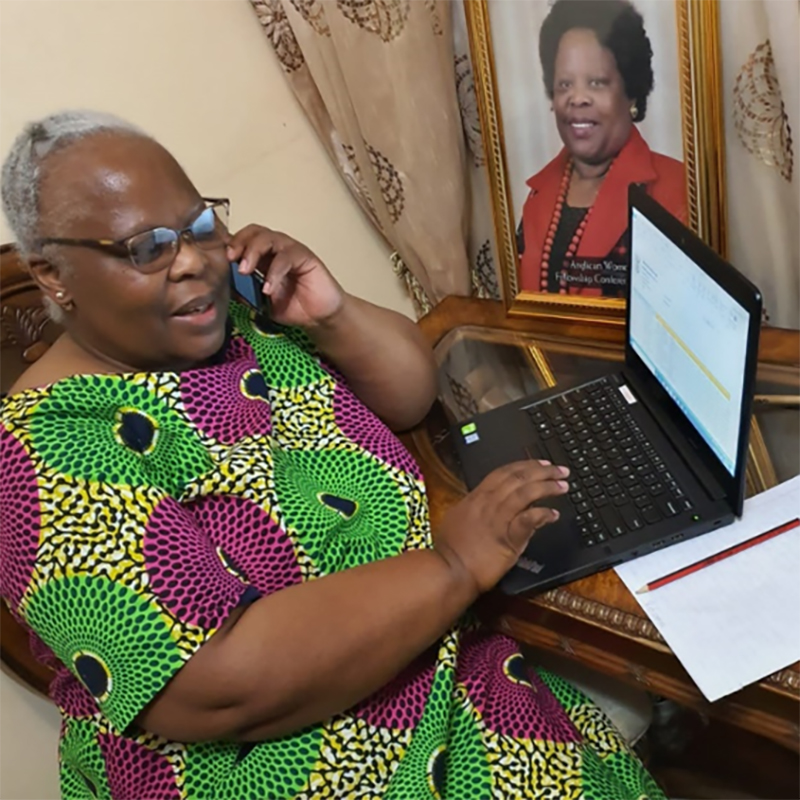Nurses at Risk of COVID-19 Telework to Help HIV Patients in South Africa
Updated November 30, 2020
The COVID-19 pandemic presented many challenges for nurses over the age of 60 in South Africa. The Nurses’ Pledge of Service compels them to put the health of their patients first. However, older adults are more likely to get severely ill from COVID-19 should they contract it. To address this, a plan implemented in South Africa allowed a group of eight nurses over the age of 60 to continue working safely from home.
When President Cyril Ramaphosa placed South Africa on lockdown to mitigate the risk of COVID-19, he encouraged employers to allow employees aged 60 or older, or those living with chronic medical conditions that may put them at higher risk of severe illness, to work at home. The Health Systems Trust (HST), a CDC implementing partner, followed the recommendation.
HST immediately developed and implemented COVID-19 risk-reduction protocols in uMgungundlovu District, in KwaZulu-Natal Province, which included allowing a team of eight senior nurse clinicians over 60 to work at home. Devising a plan to task-shift clinical work was challenging at first, but HST found ways of deploying staff capacity to support continuity of HIV services while entrenching COVID-19 biosecurity measures and complying with national lockdown regulations.

Sister Lindiwe Msimang and her colleagues used humility and compassion to win patients’ hearts.
Photo Courtesy of Health Systems Trust
Elite 8 provide targeted service to support people with HIV
A survey conducted by the University of Cape Town Centre for Infectious Disease Epidemiology and Research in 2019 found that approximately 2.5 million people in South Africa living with HIV are not virally suppressed. Roughly one-quarter of those who know they are HIV-positive are not taking or have stopped taking antiretroviral therapy (ART). Retaining patients in care is a priority for South Africa, and the nurse clinicians, aptly called the Elite 8, were recognized as being perfectly placed to add value by interacting with those with high viral loads who needed support through targeted retention services.
Approximately 2.5 million people in South Africa who are living with HIV are not virally suppressed and roughly a quarter of those who know they are HIV-positive are not taking or have stopped taking antiretroviral therapy.
HST developed several tools for identifying eligible patients, tracking the number called daily to offer treatment adherence support and guidance on transitioning to TLD, setting up appointments for clinical review and medicine supply, and recording post-appointment follow-up on the services received.
Over the following three months, the Elite 8 contacted 8,994 patients, some more than once, to discuss their experiences of ART adherence and facilitated the transition of 4,894 people to TLD. Reaching and convincing thousands of clients to transition to TLD was not easy. Some patients expressed anger about negative interactions they had experienced at the clinic, with many refusing to attend again. This required the Elite 8 to demonstrate humility and compassion to engage them in the new approach.
“I had to be sensitive to any personal difficulties and struggles within the aspect of information given by the client, understanding that clients are from different background with different personalities”
“I had to be sensitive to any personal difficulties and struggles within the aspect of information given by the client, understanding that clients are from different background with different personalities,” Hadebe says.
“By expressing love, concern and acceptance, I won over many of them, and some wished I could be there when they come to the clinic. I had to be honest that it might not be possible, but promised they will be treated with care,” she explains.
The empathy and honesty the Elite 8 expressed seems to have worked wonders for clients who interacted with them on the phone. One shared kind words about her experience, saying, “I have never felt so loved and cared for; please keep it like this so that we look forward to going to the clinic.”
The Elite 8 continue to receive feedback from satisfied patients, who now feel empowered by knowing more about family planning and Central Chronic Medicines Dispensing and Distribution, a free service that helps people get their medication from a convenient pick-up point. Because of the rapport they built, patients now call for advice related to their personal lives and psychosocial or cultural issues, such as teenage children’s poor adherence to ART; deaths of family members on ART; substance abuse; navigating TLD transition with partners; and how to plan for pregnancy within marriage.